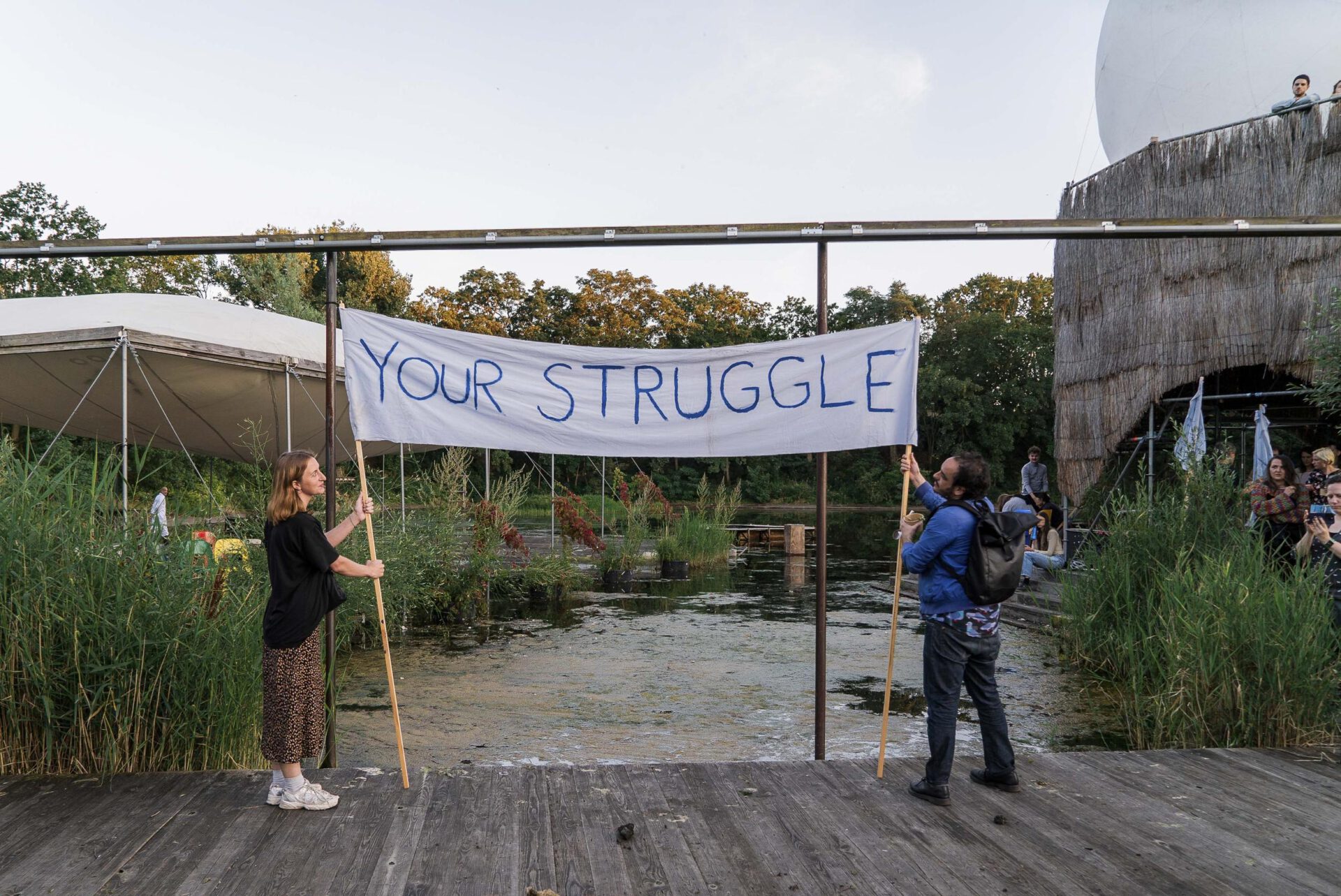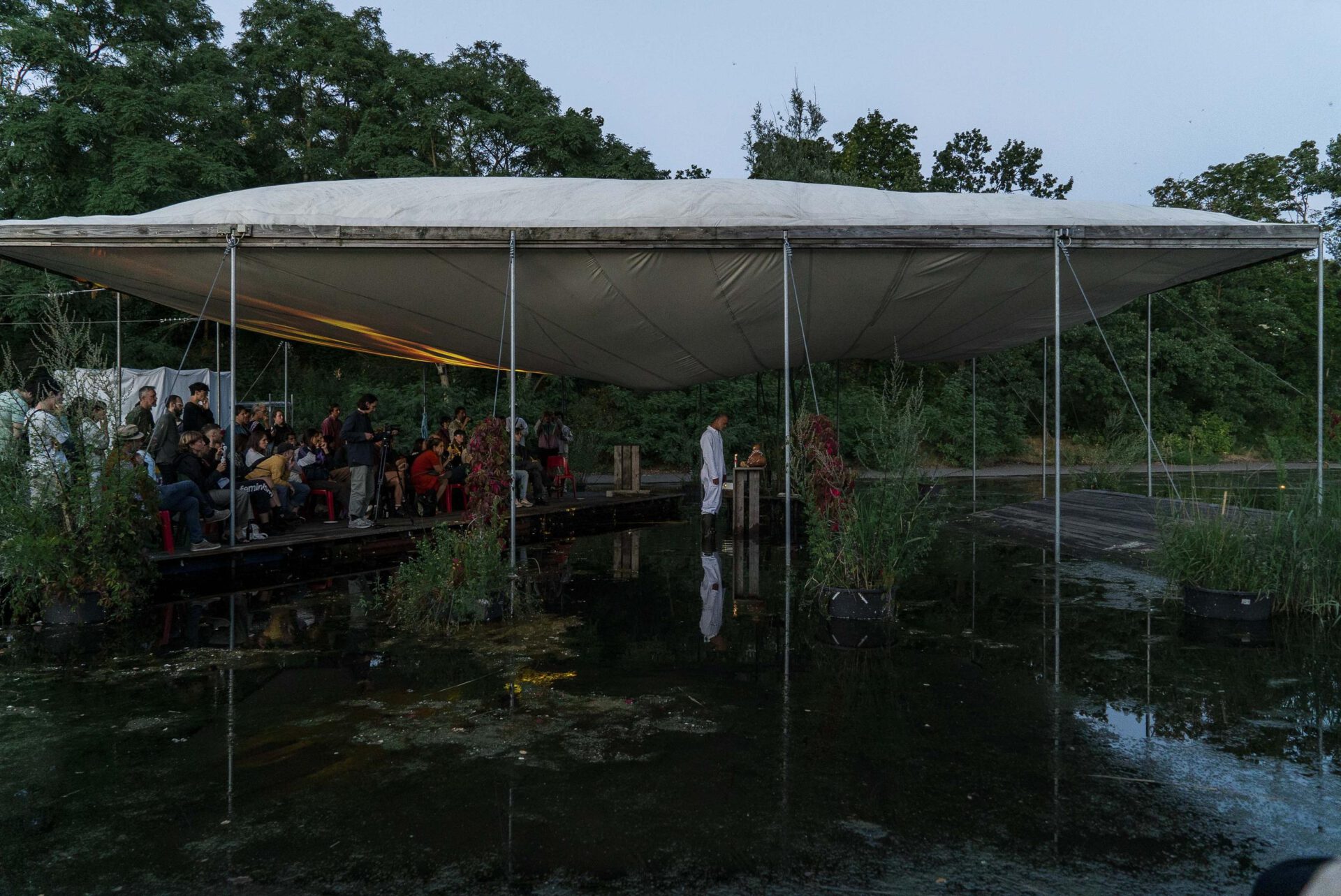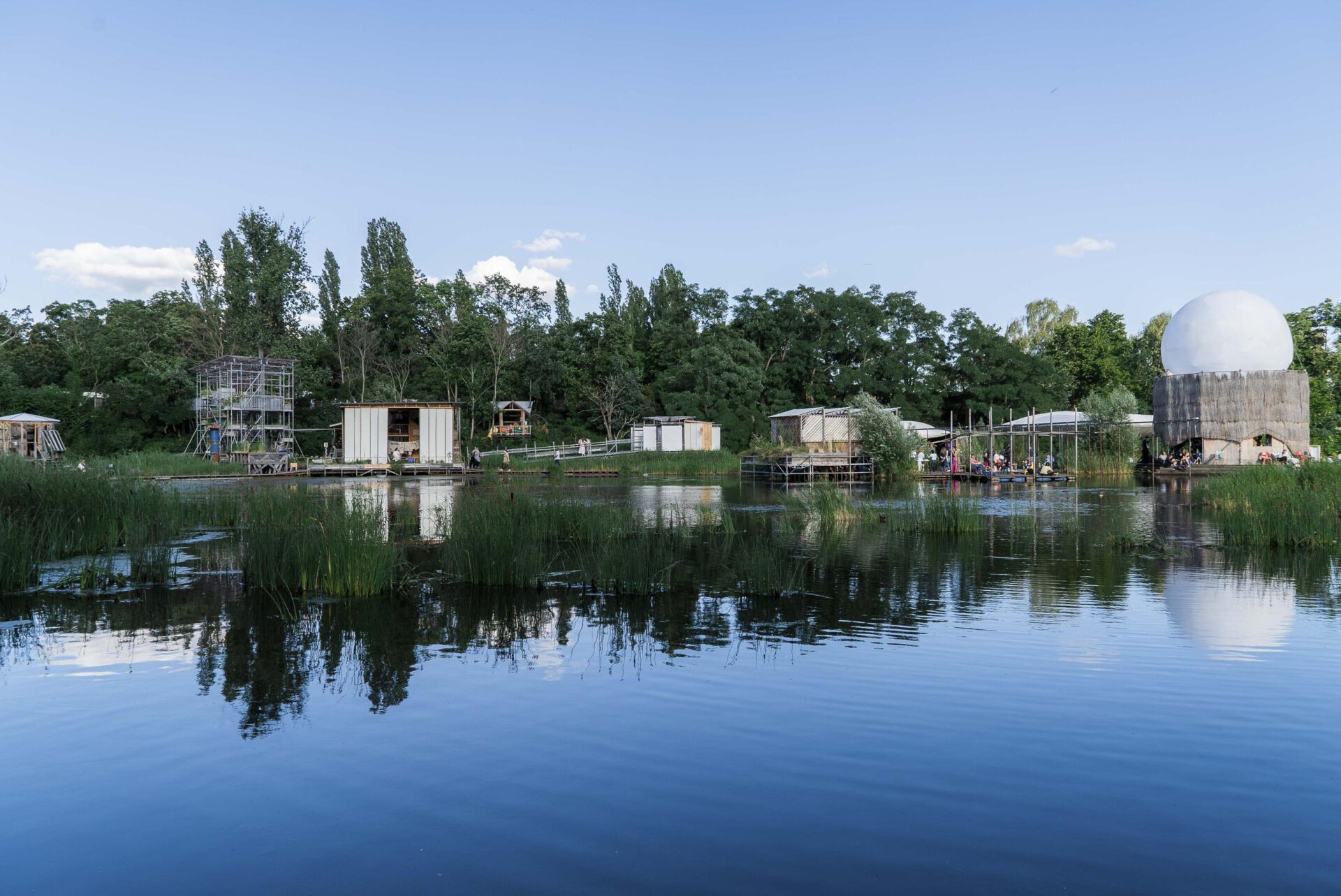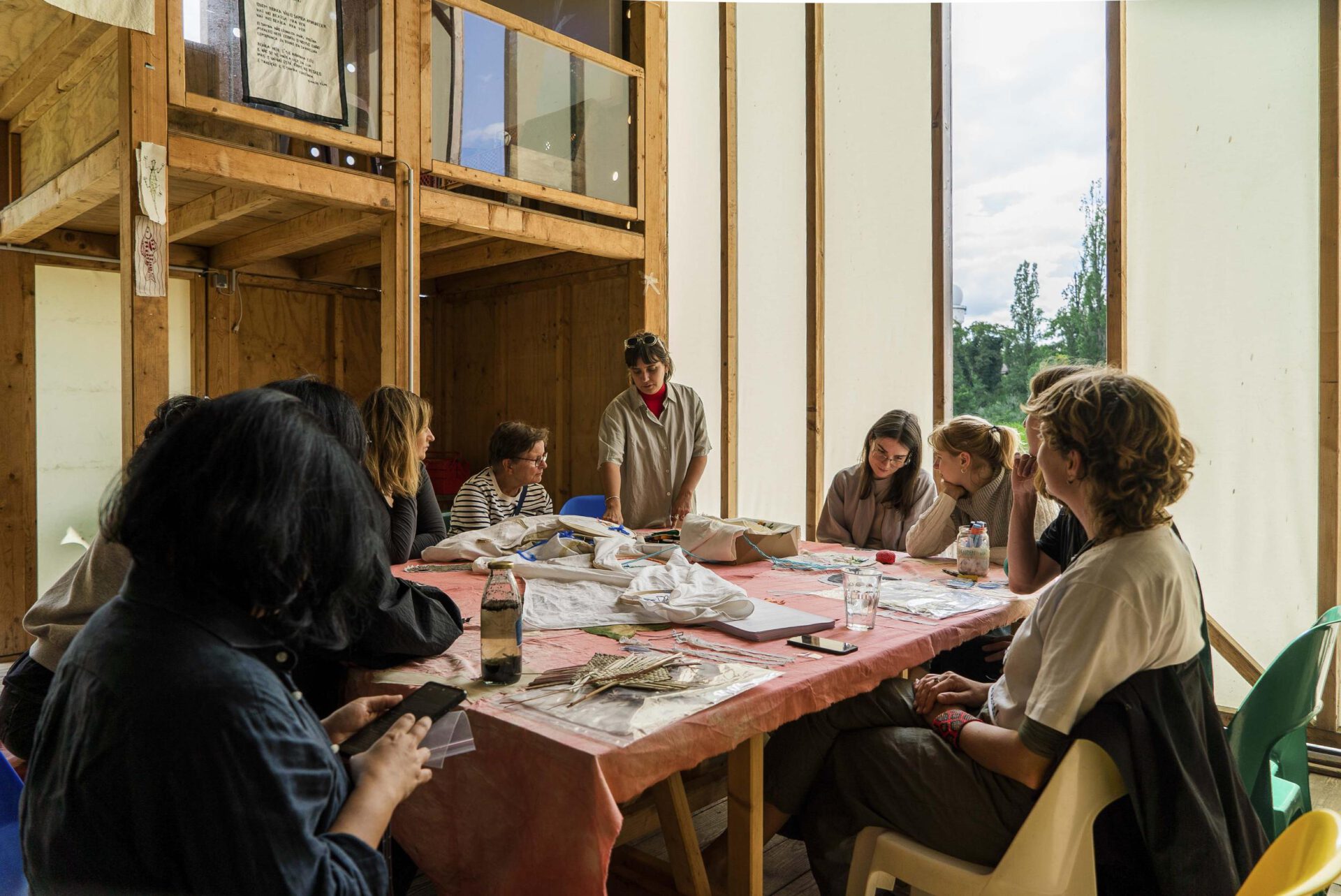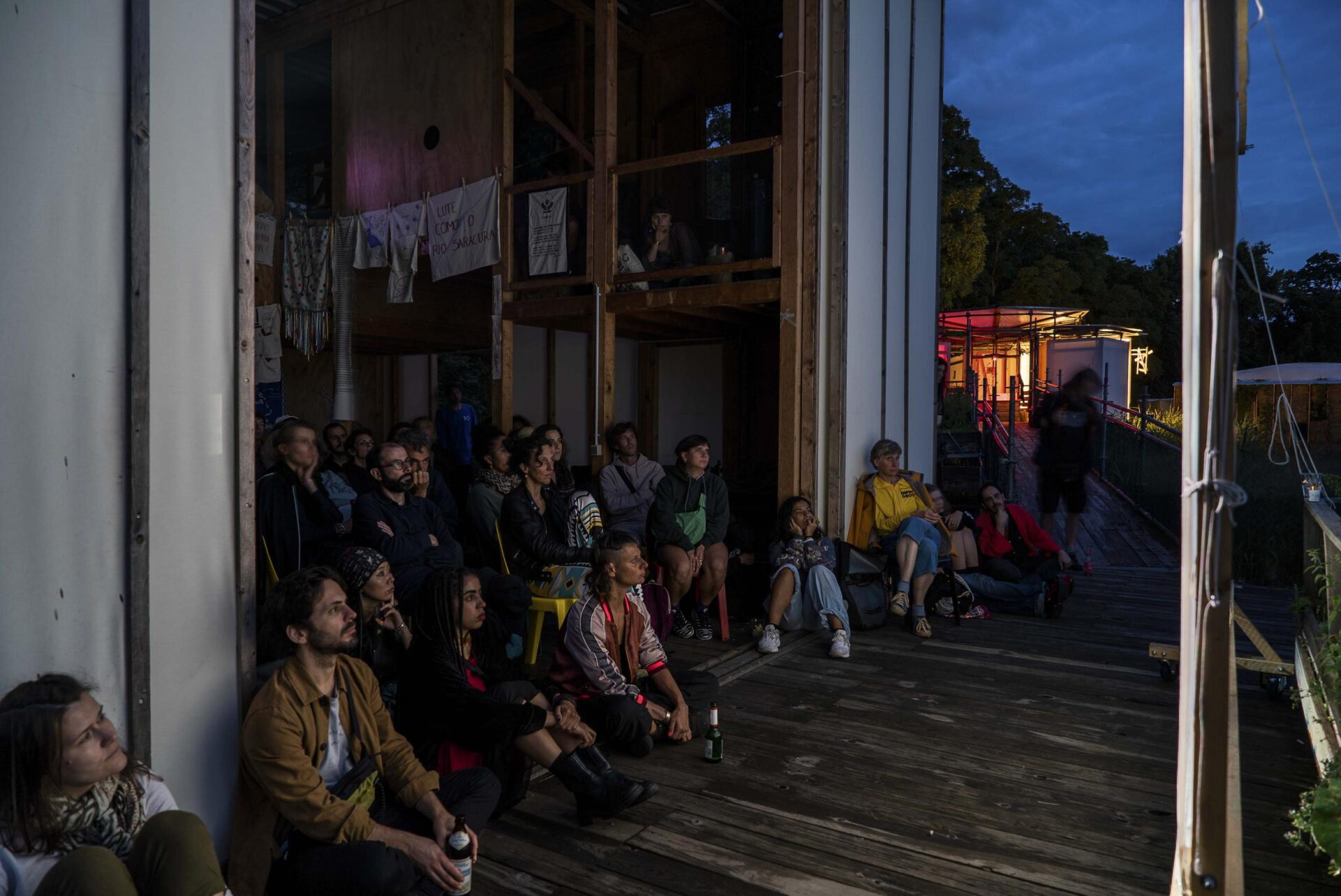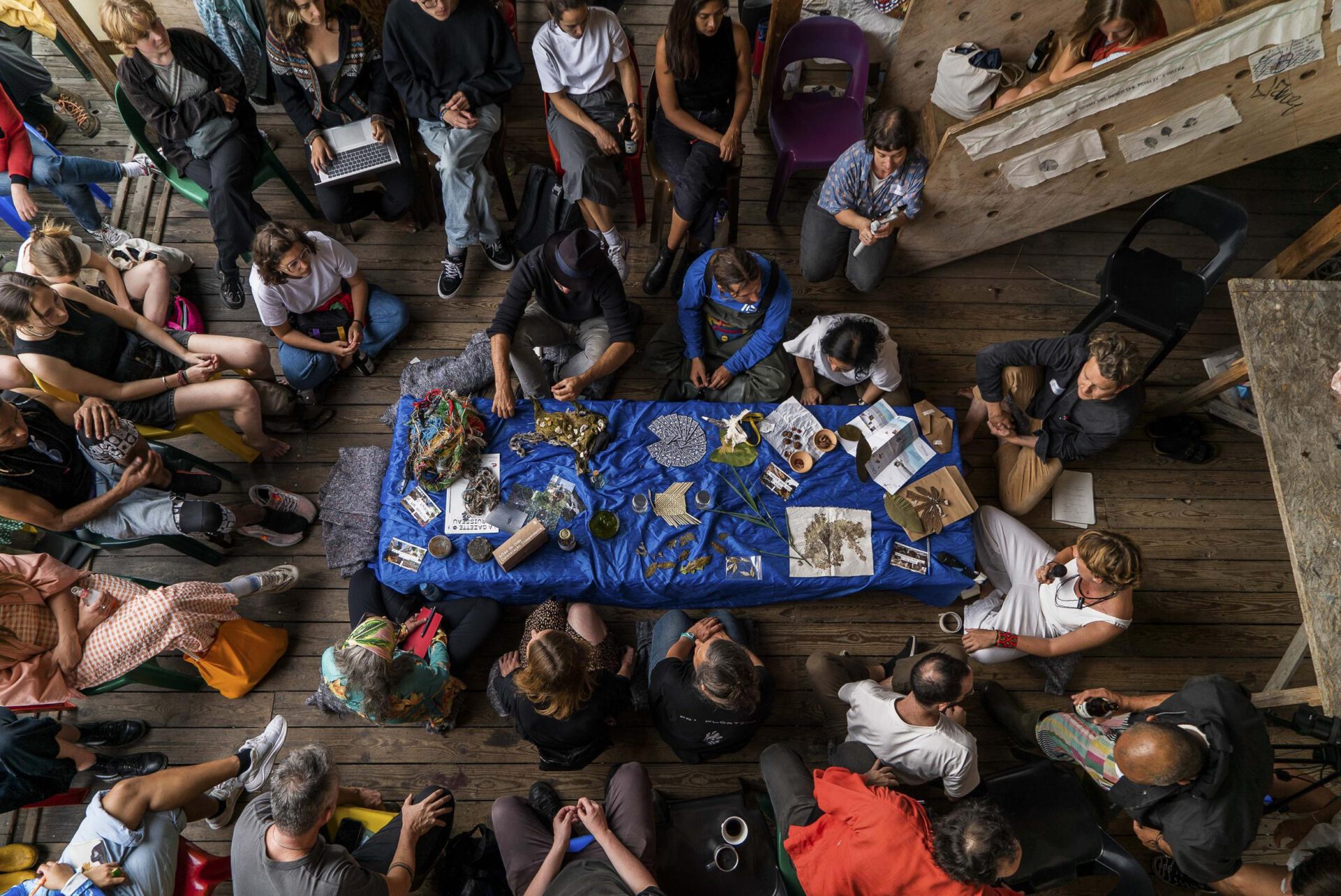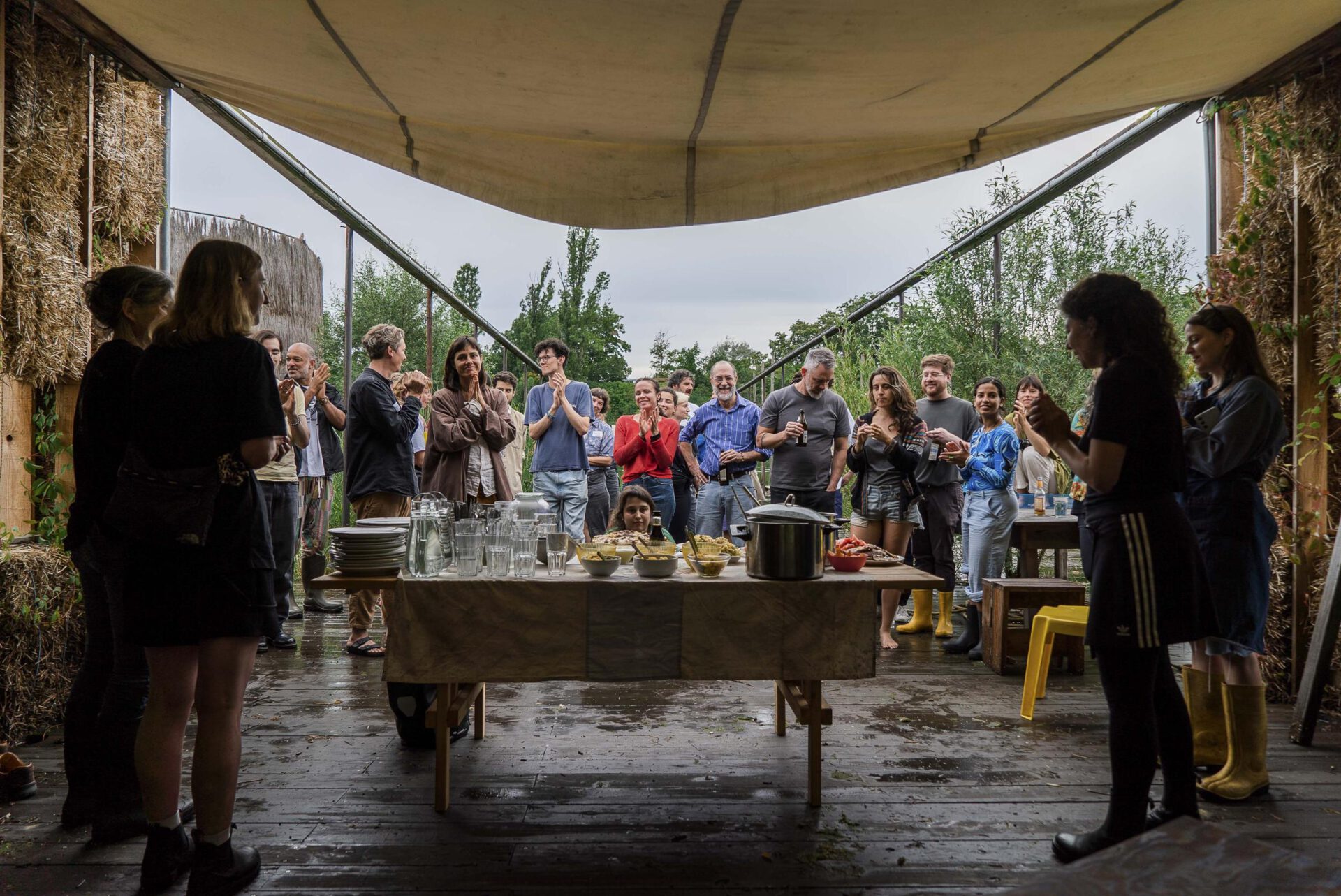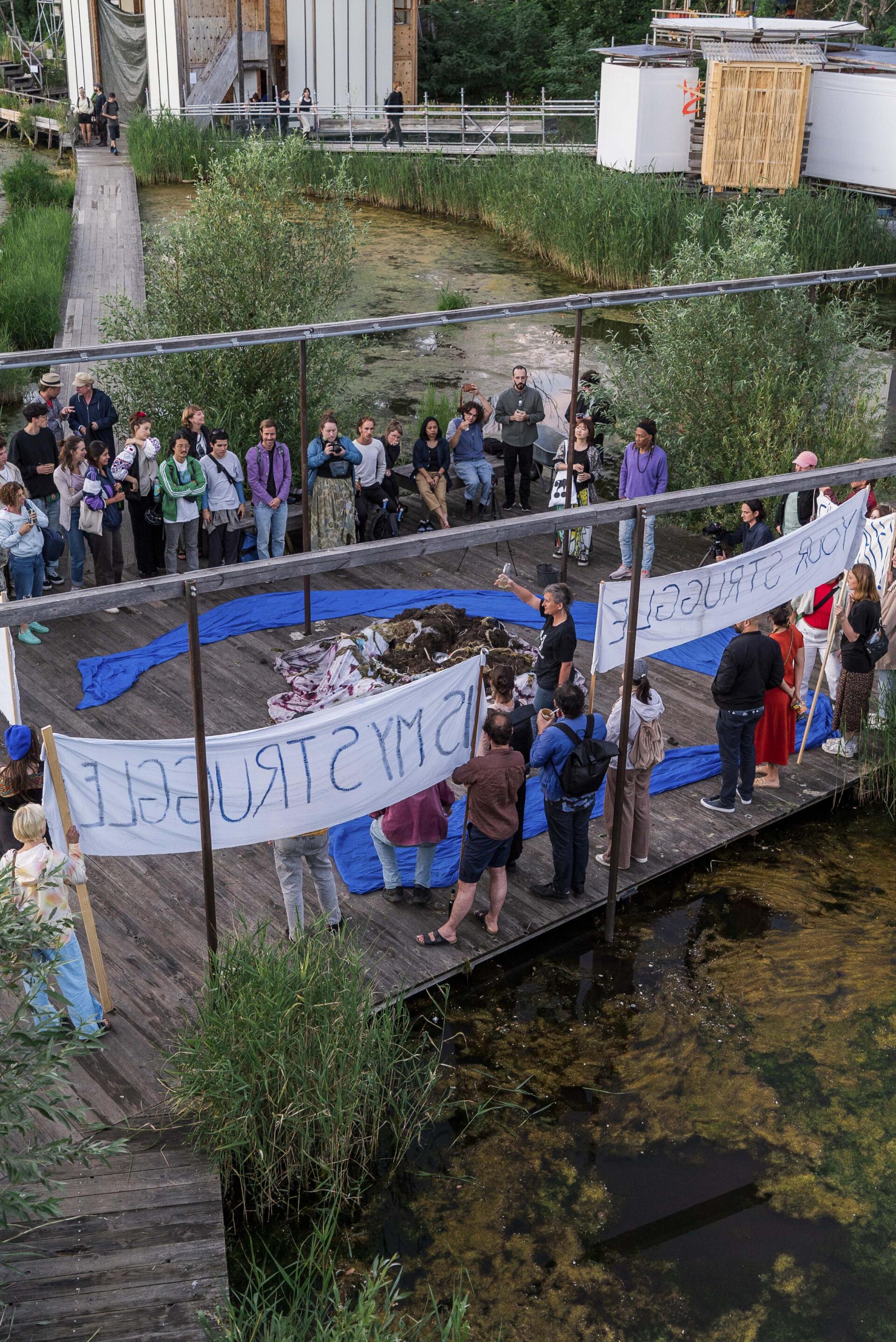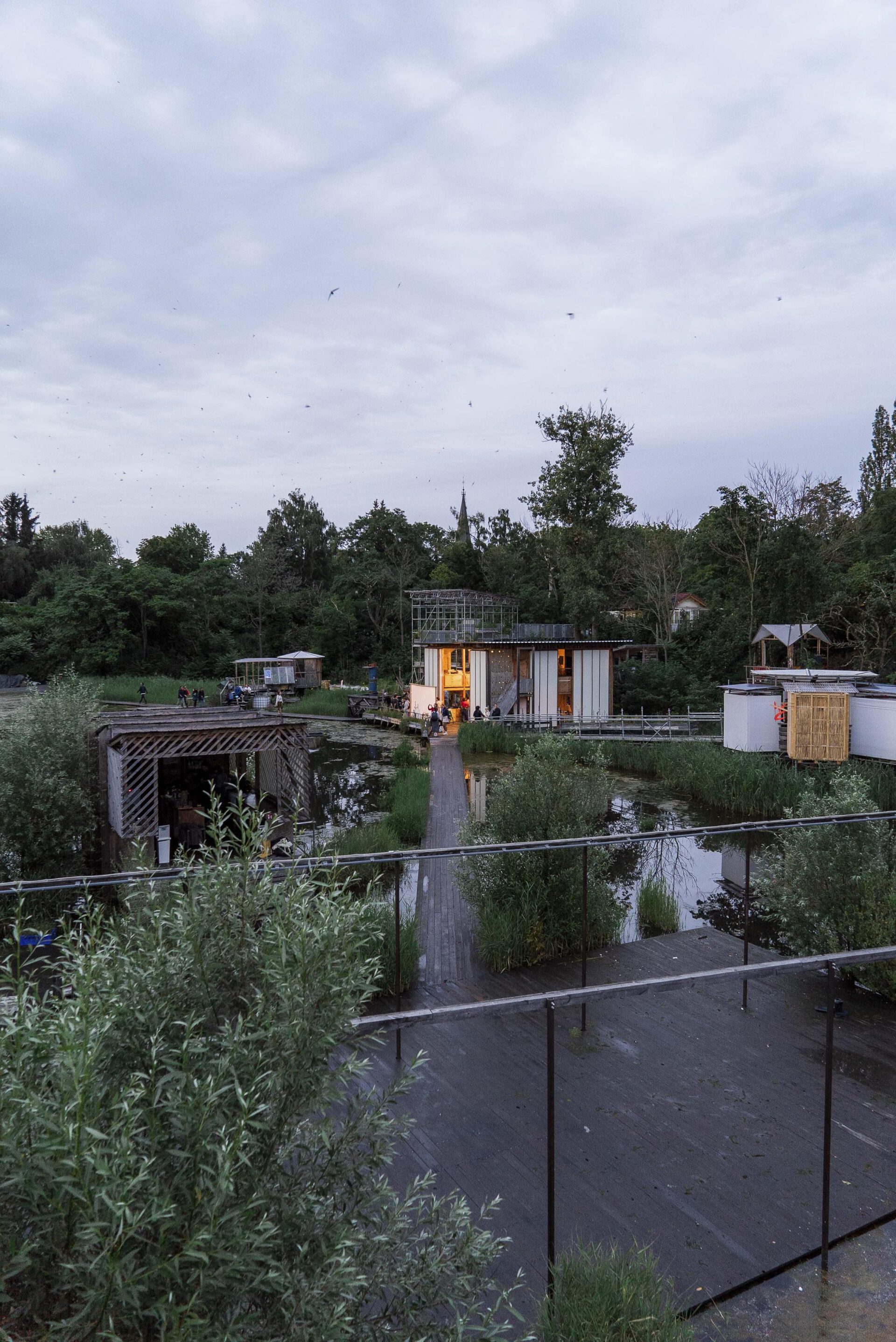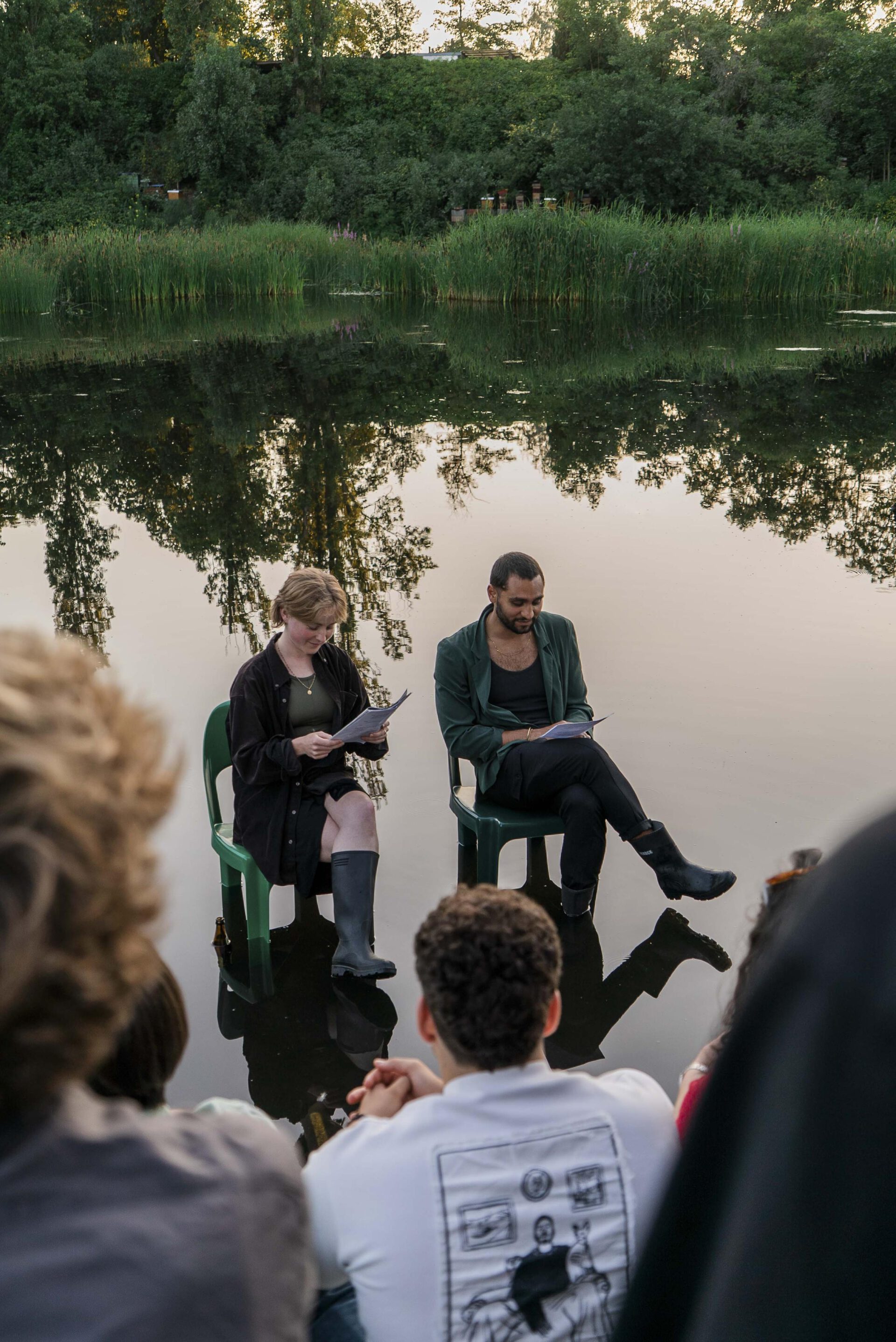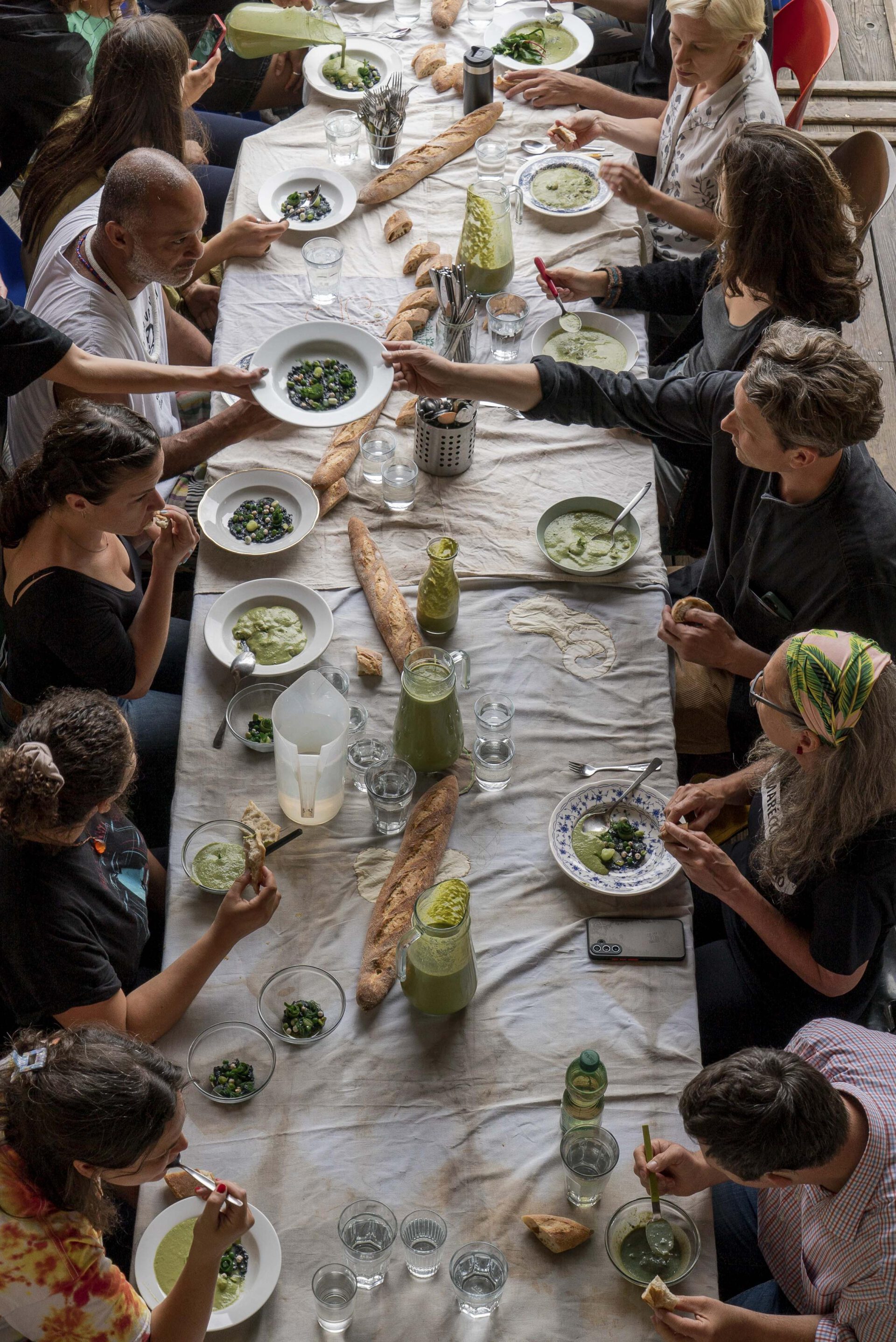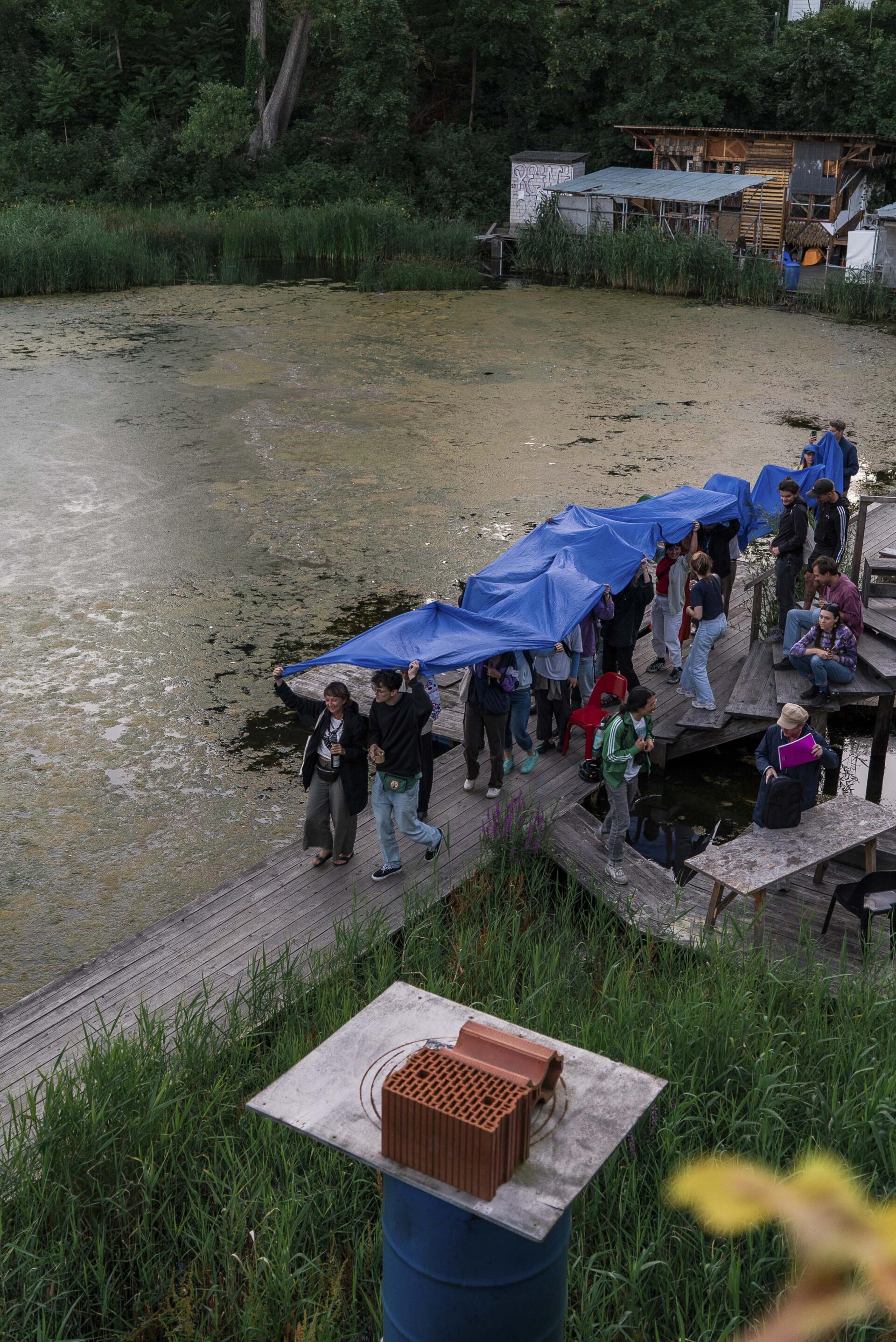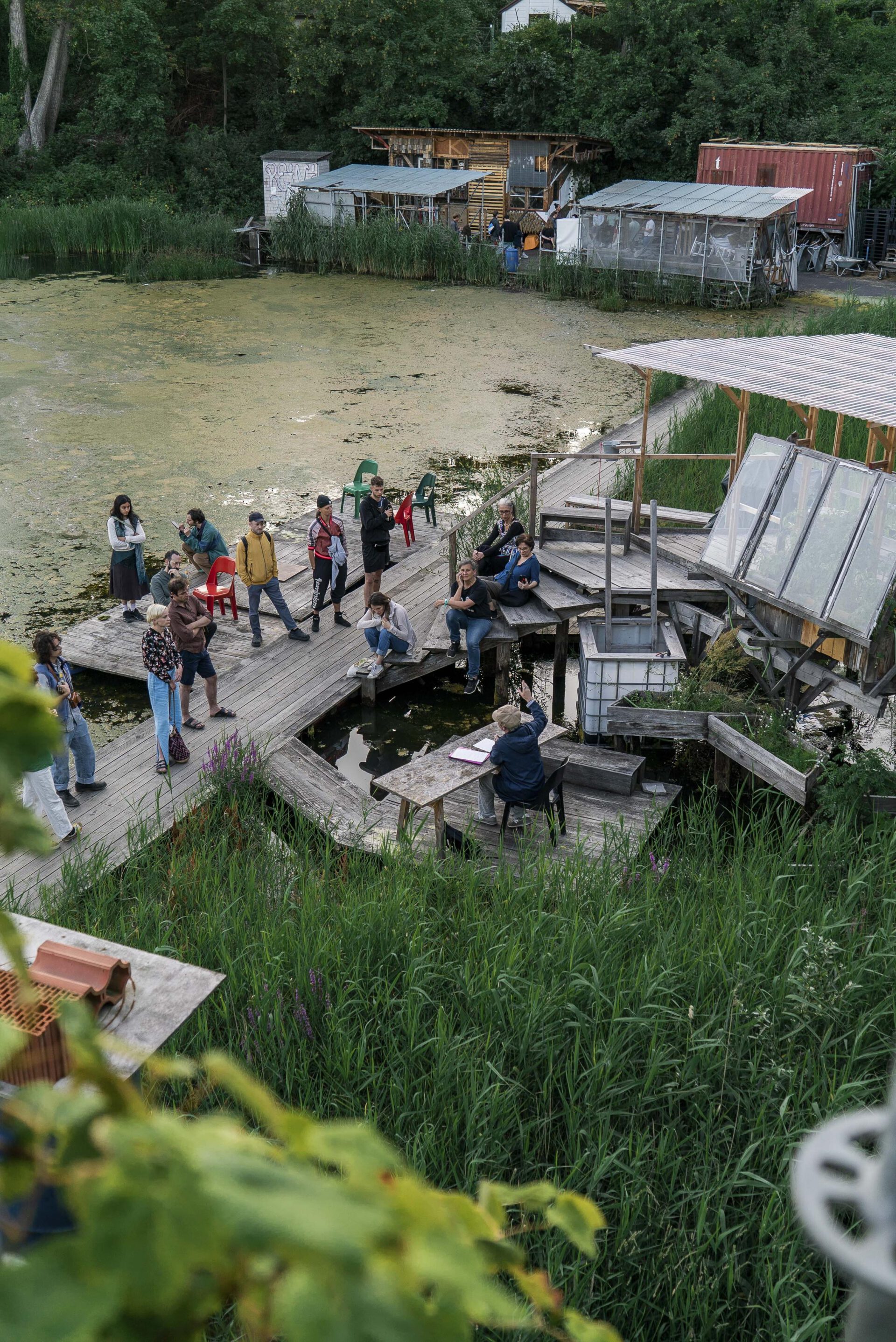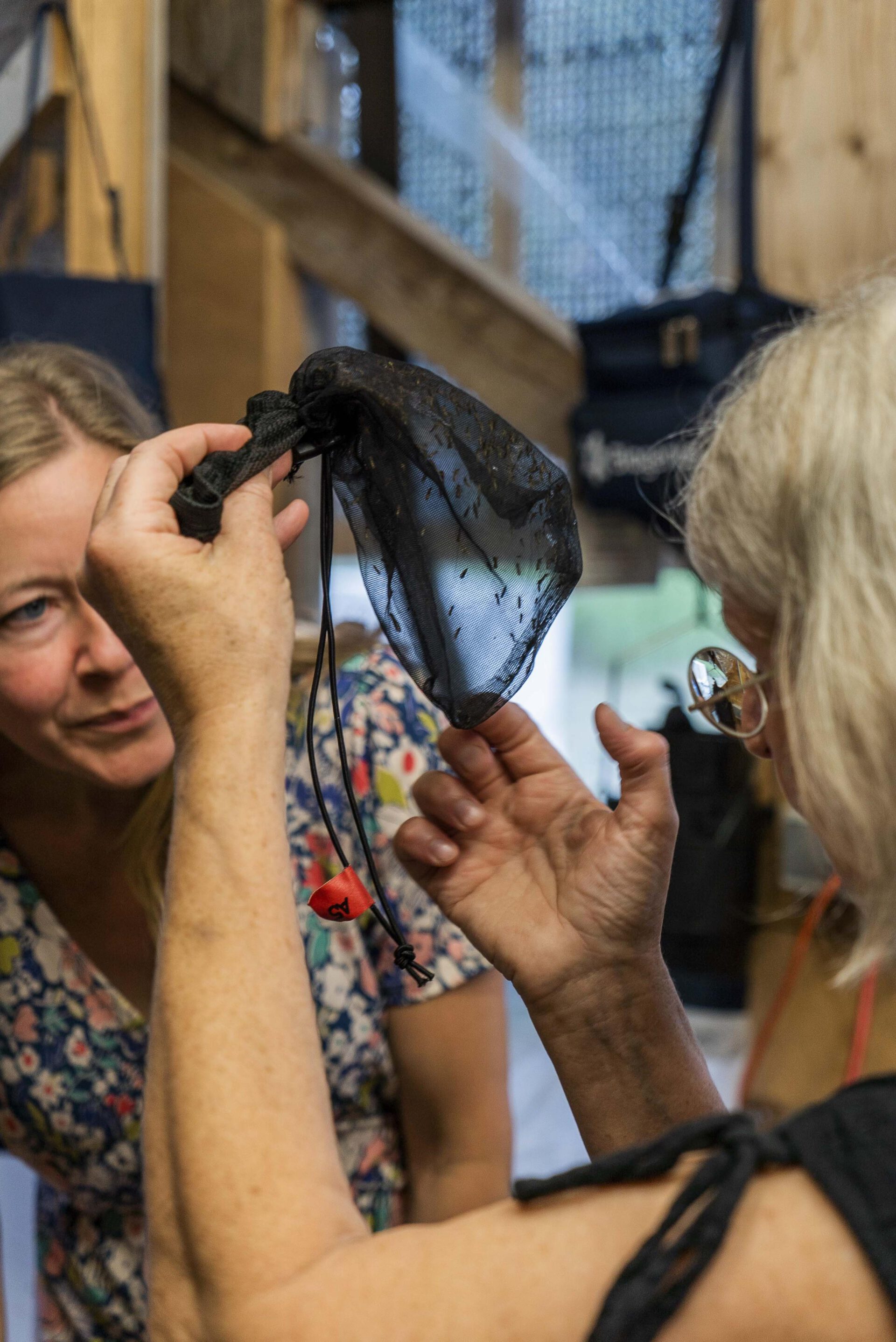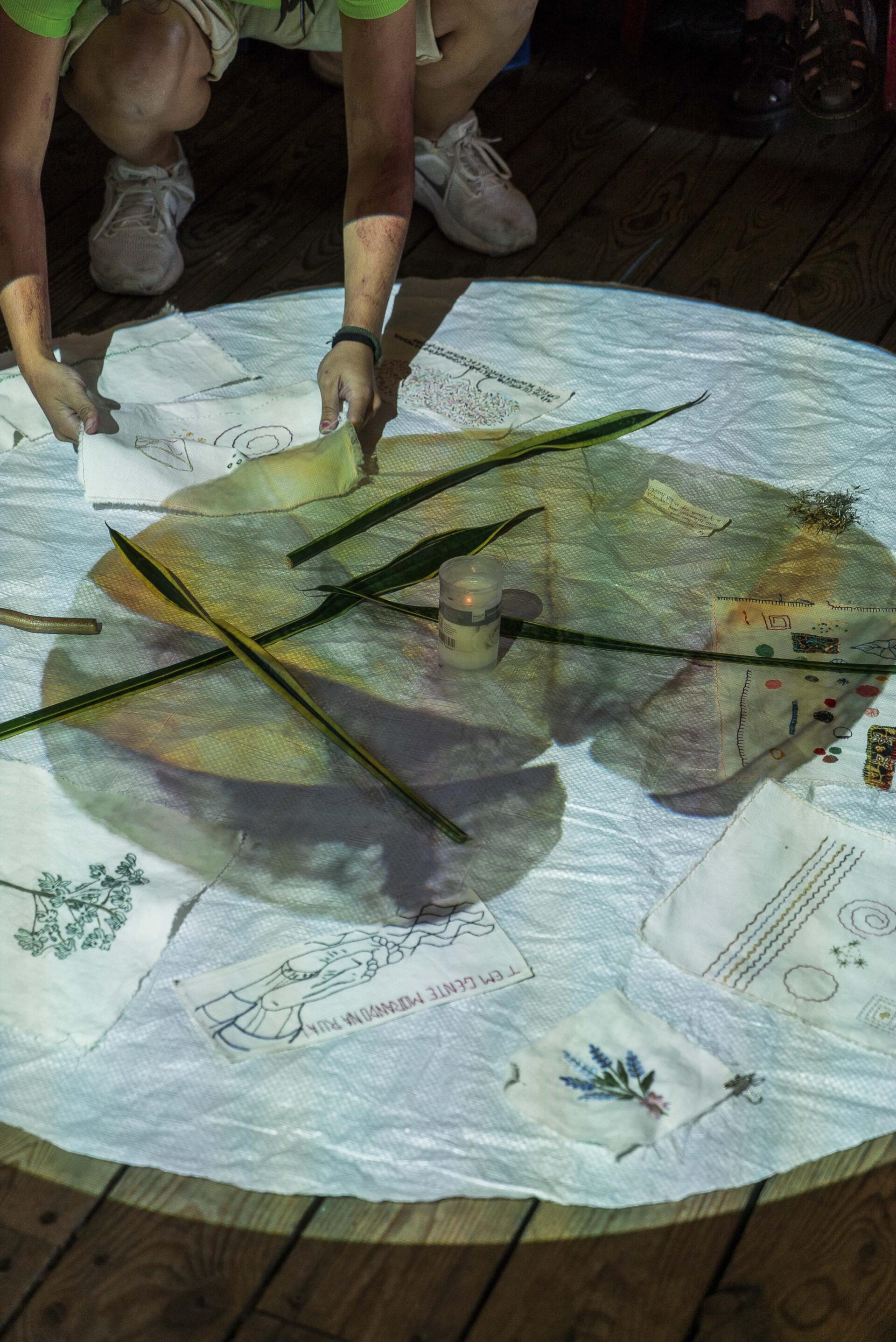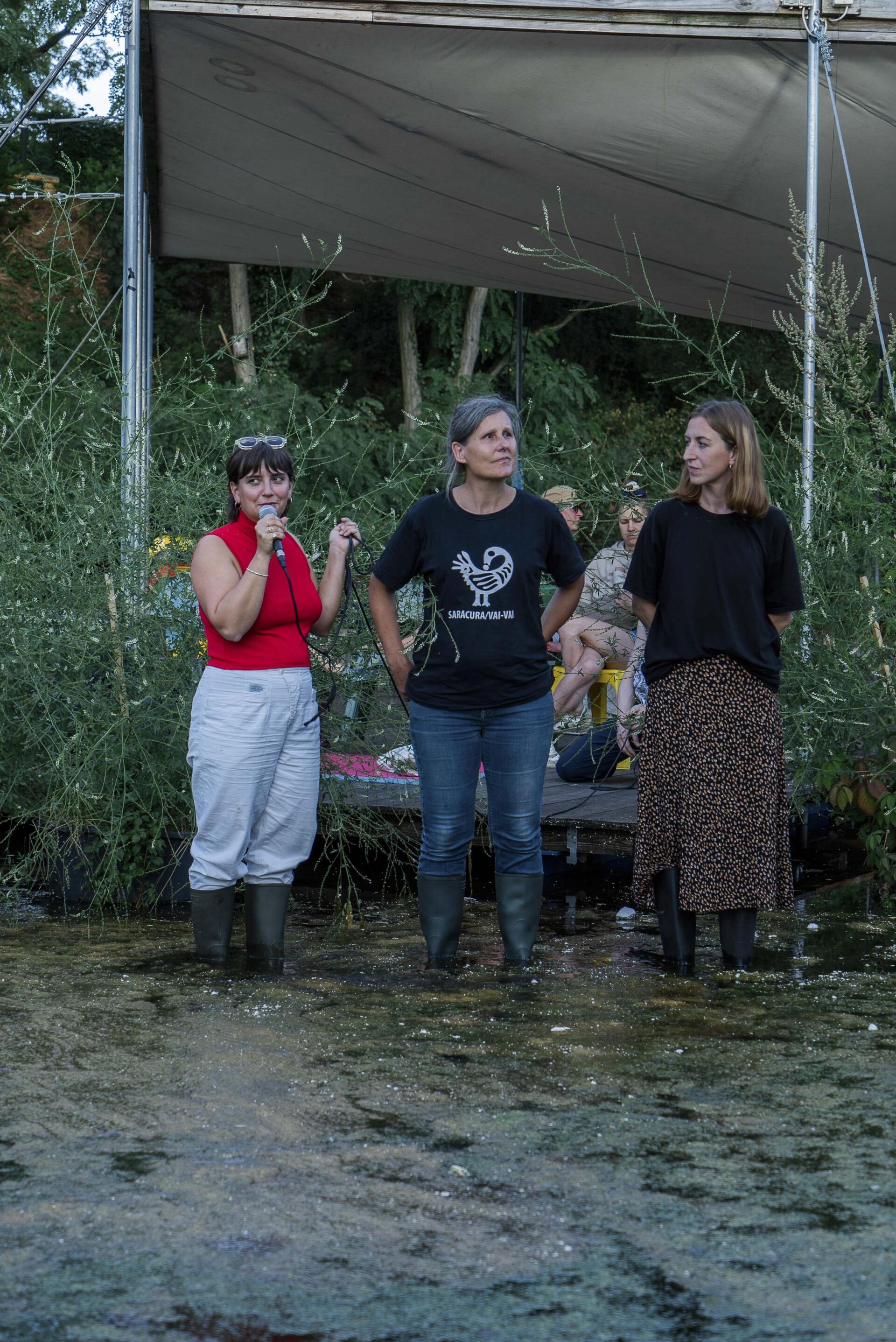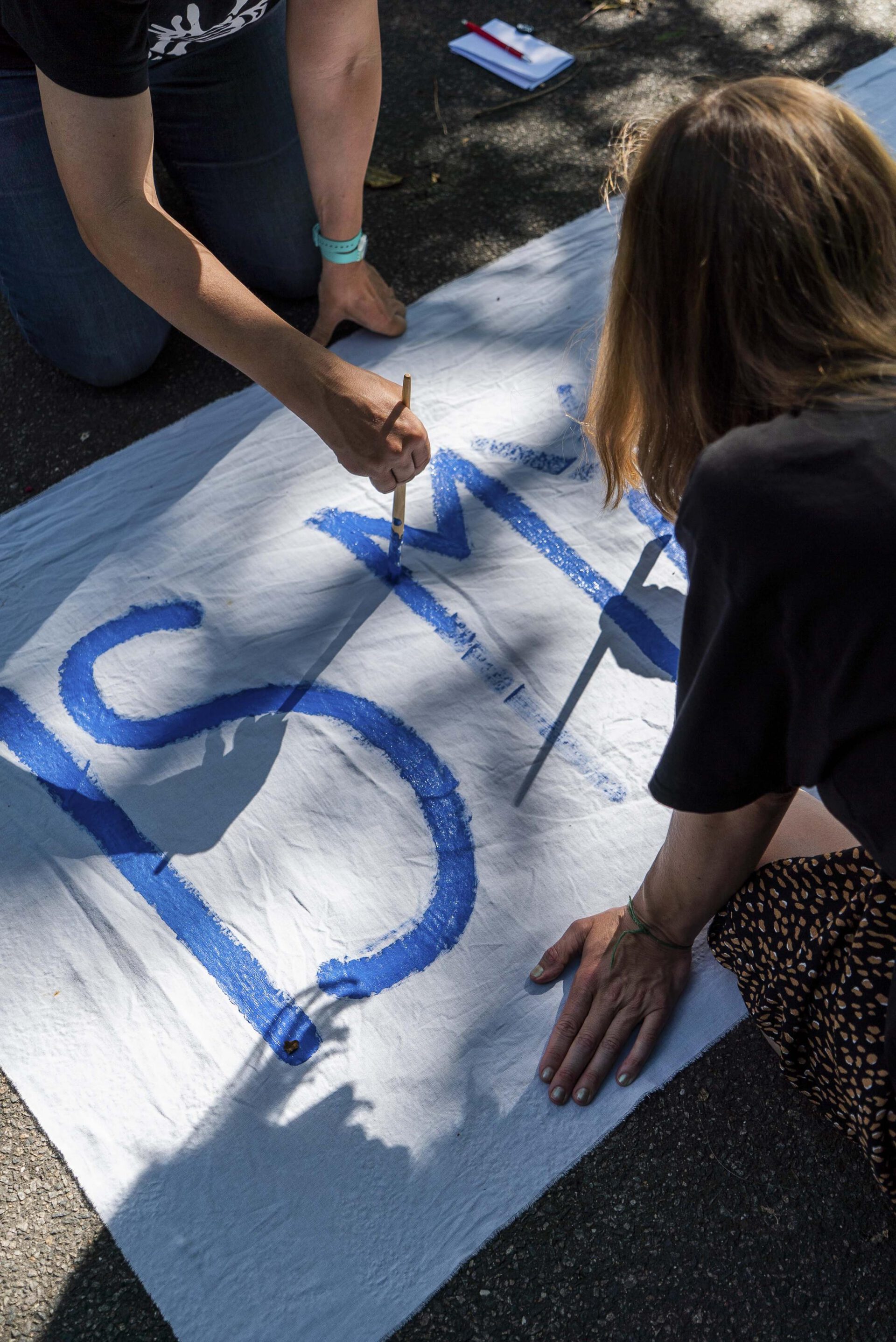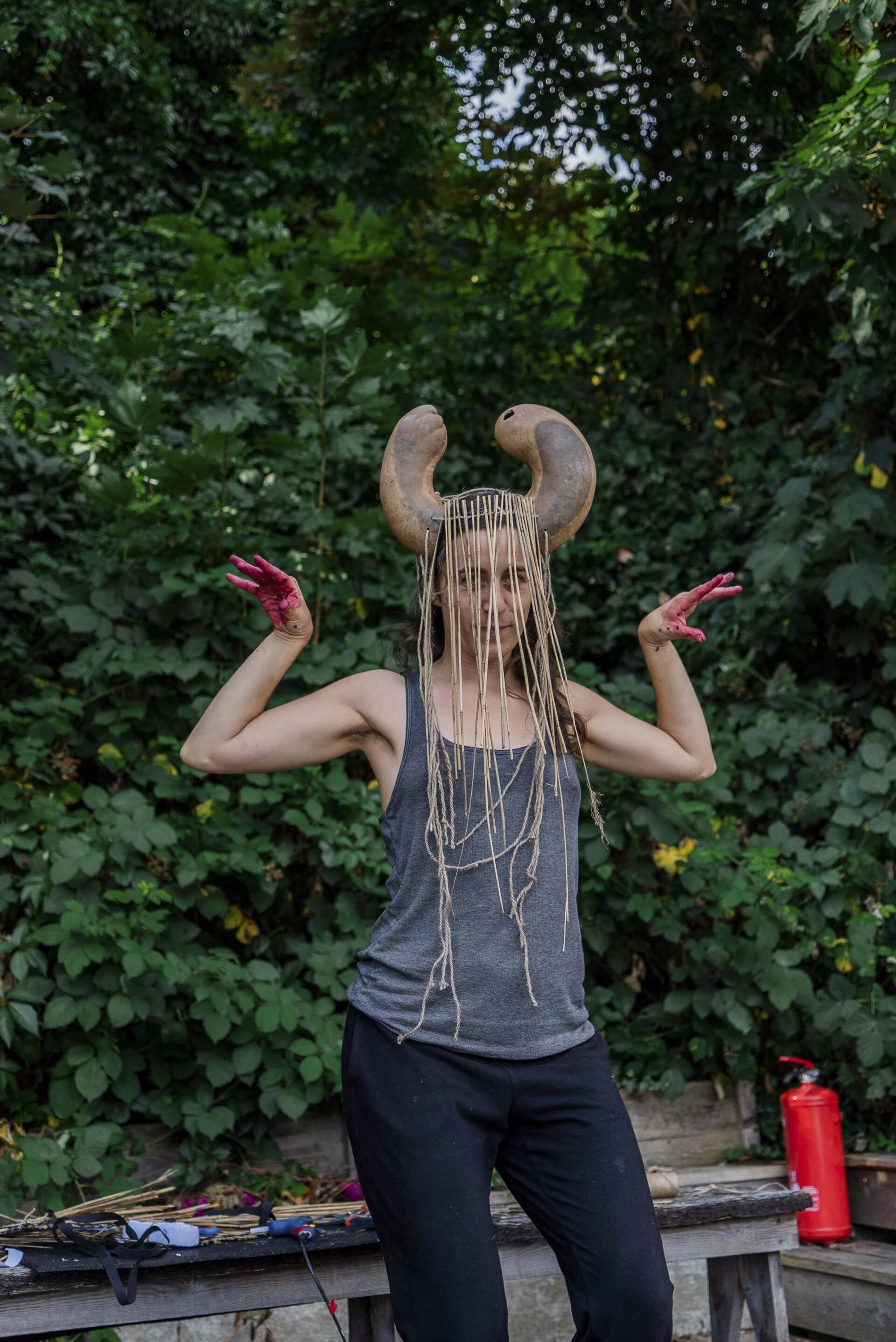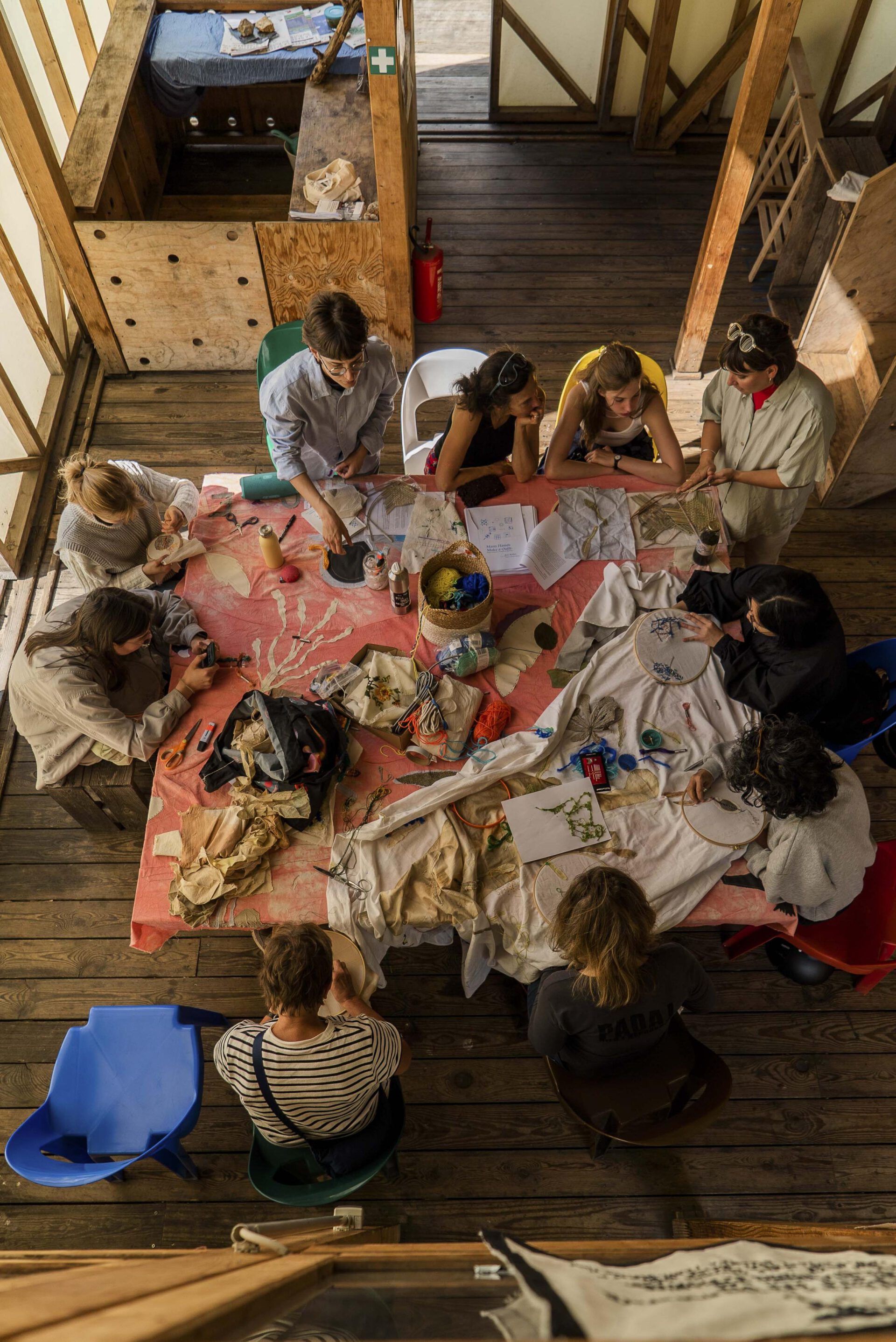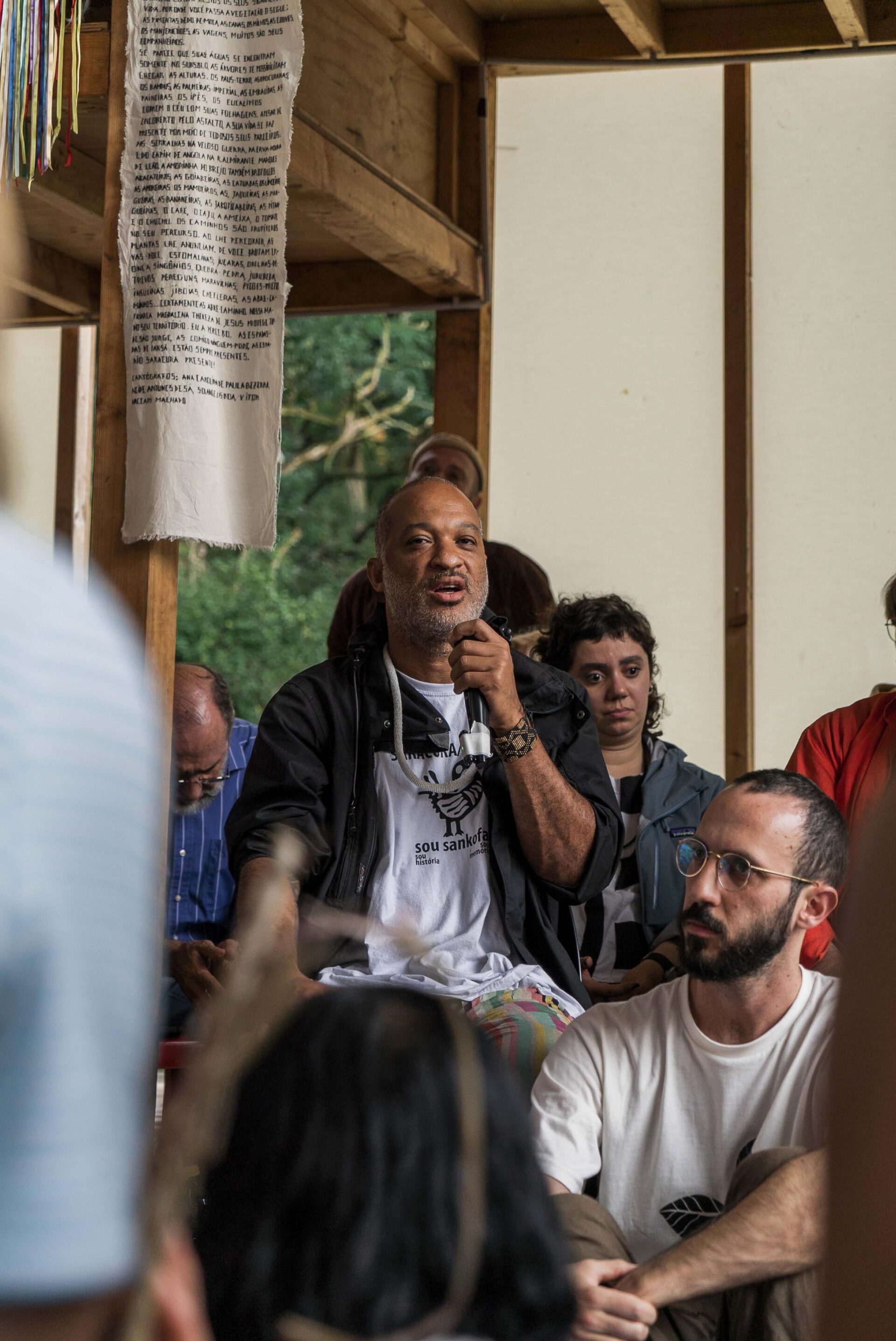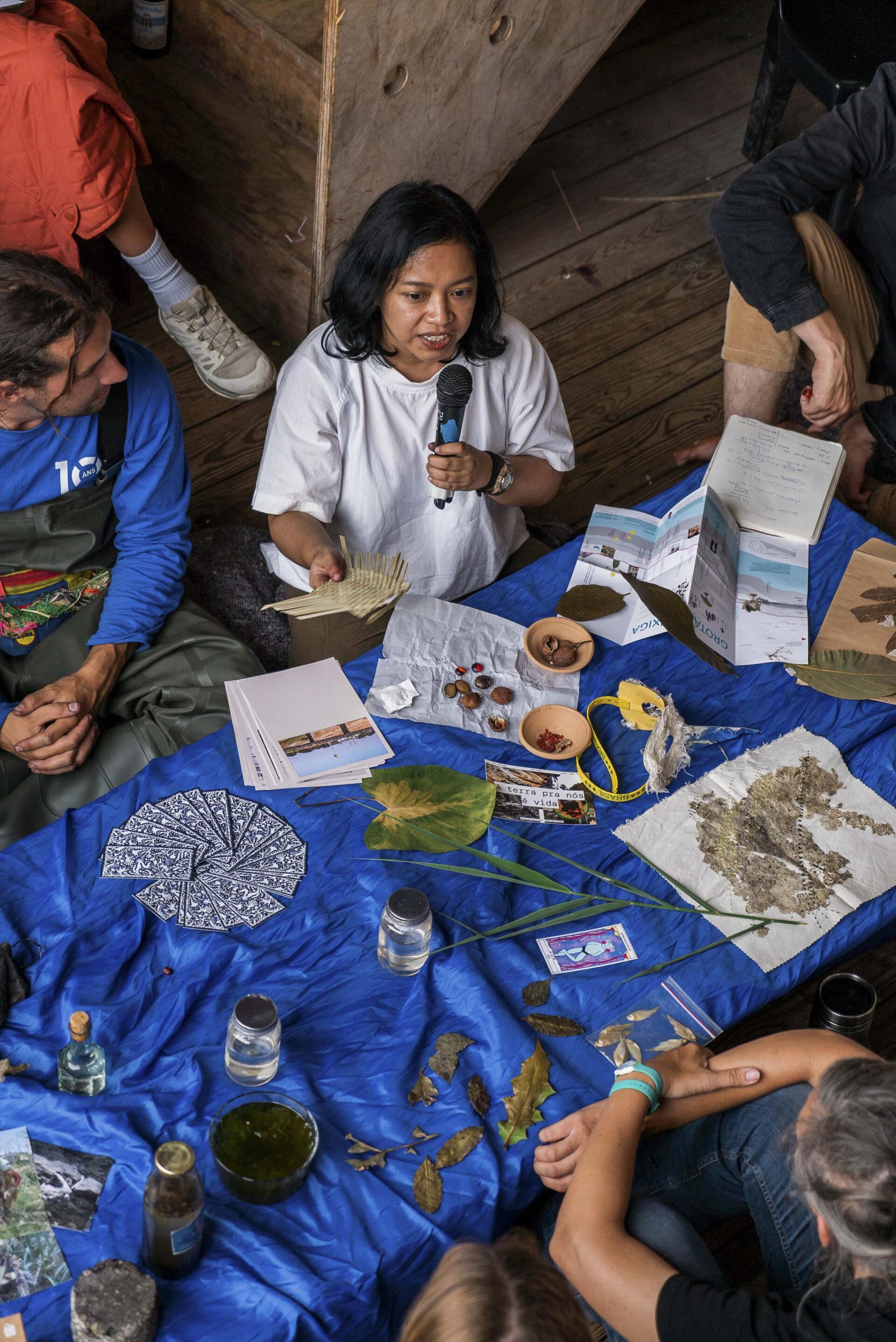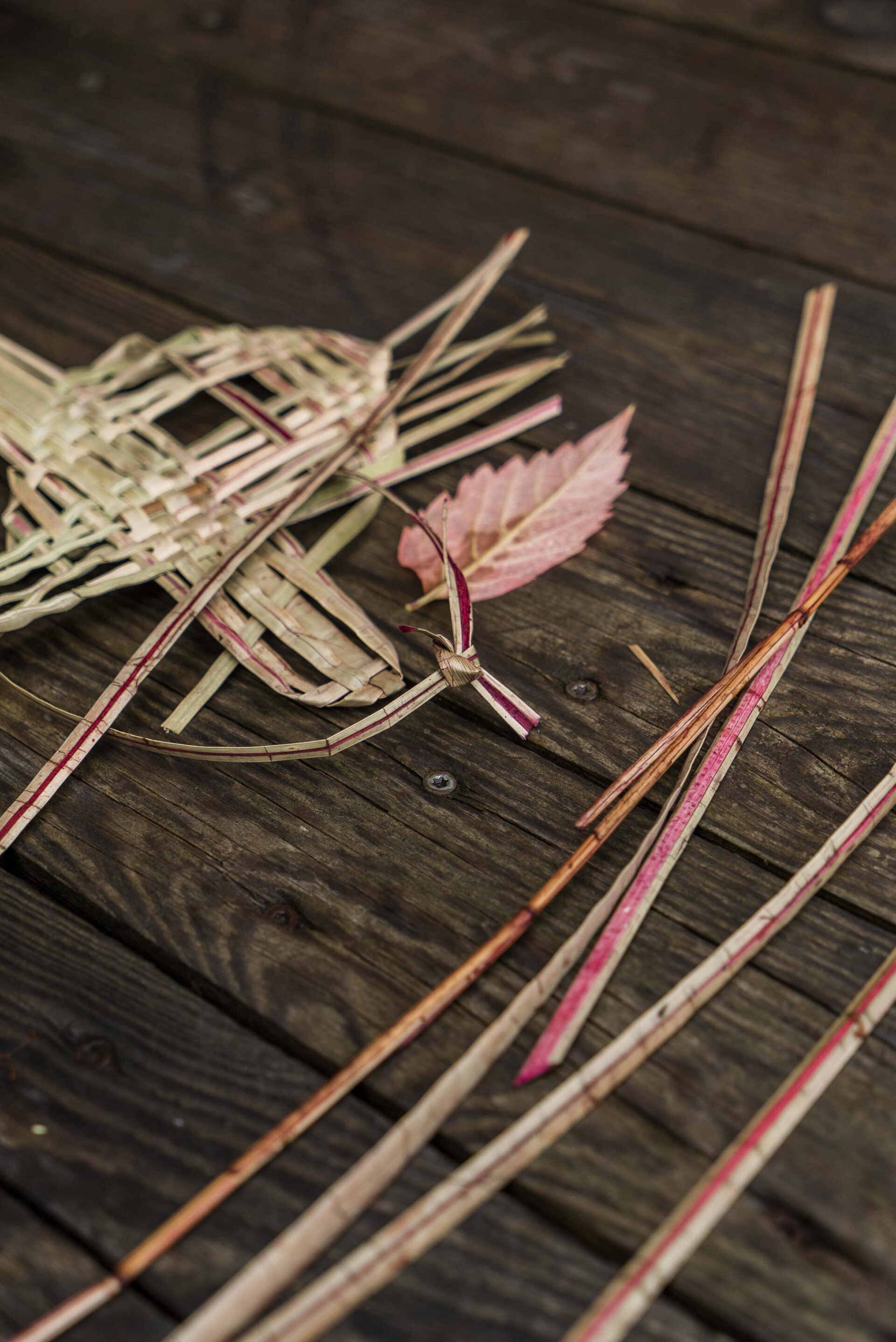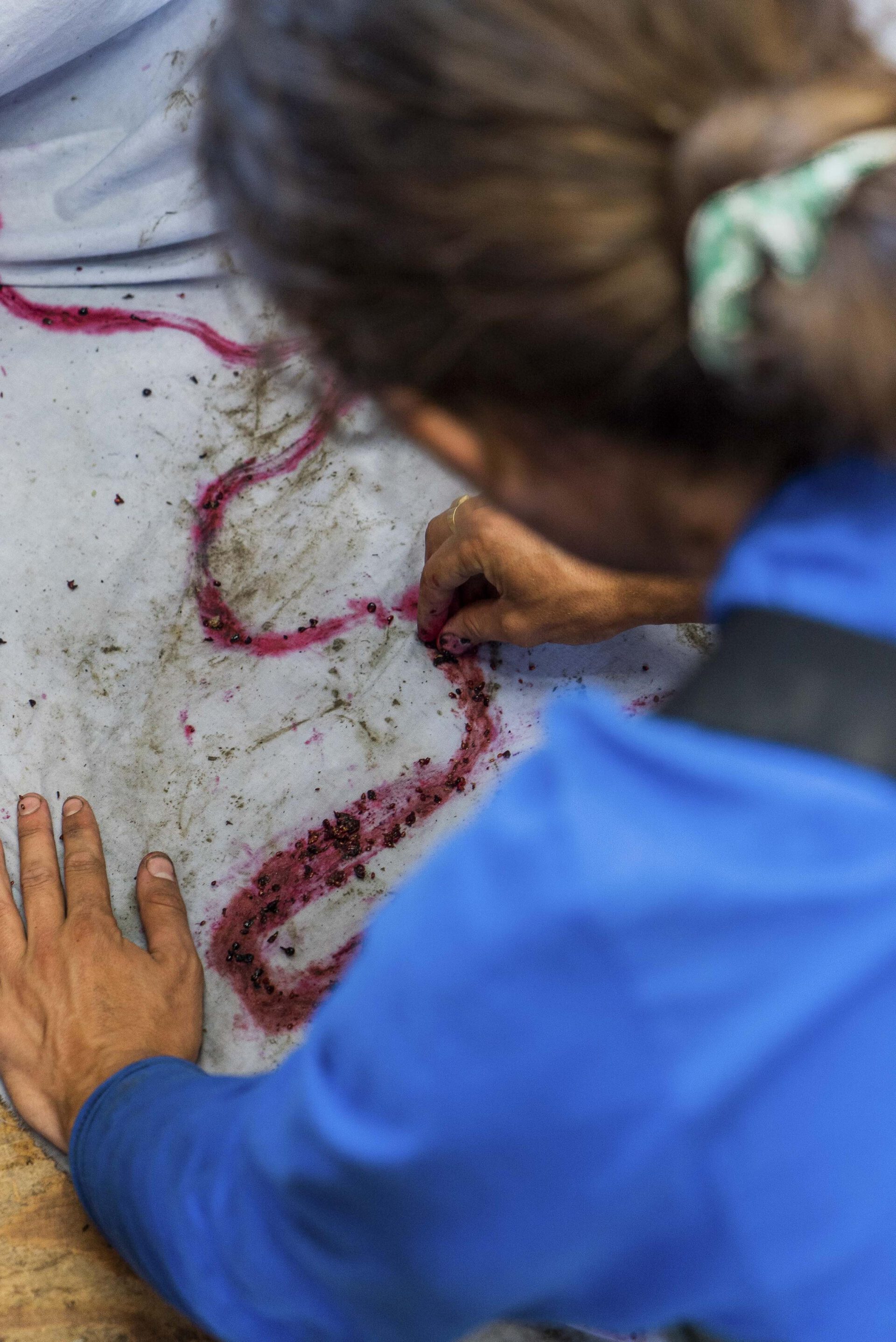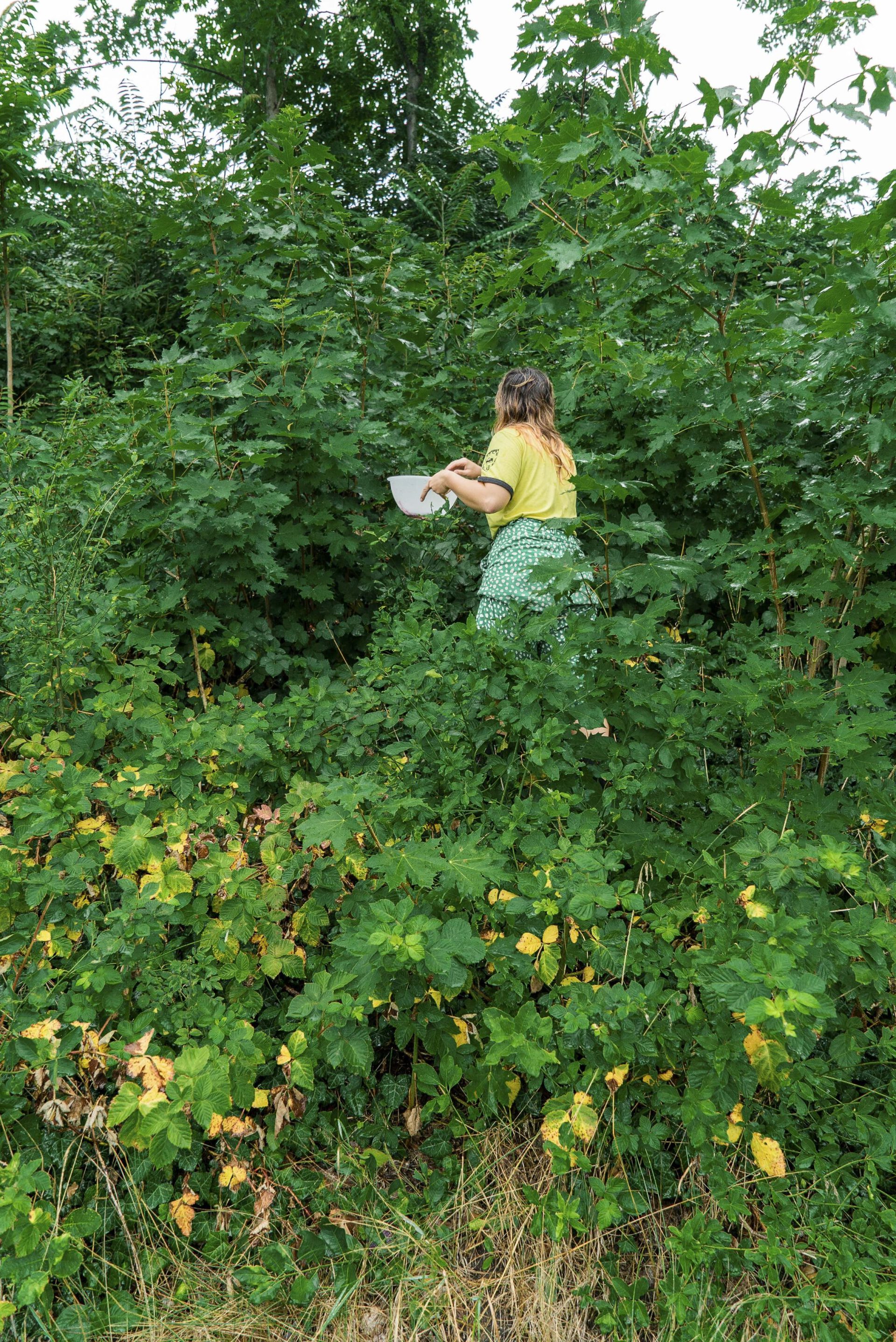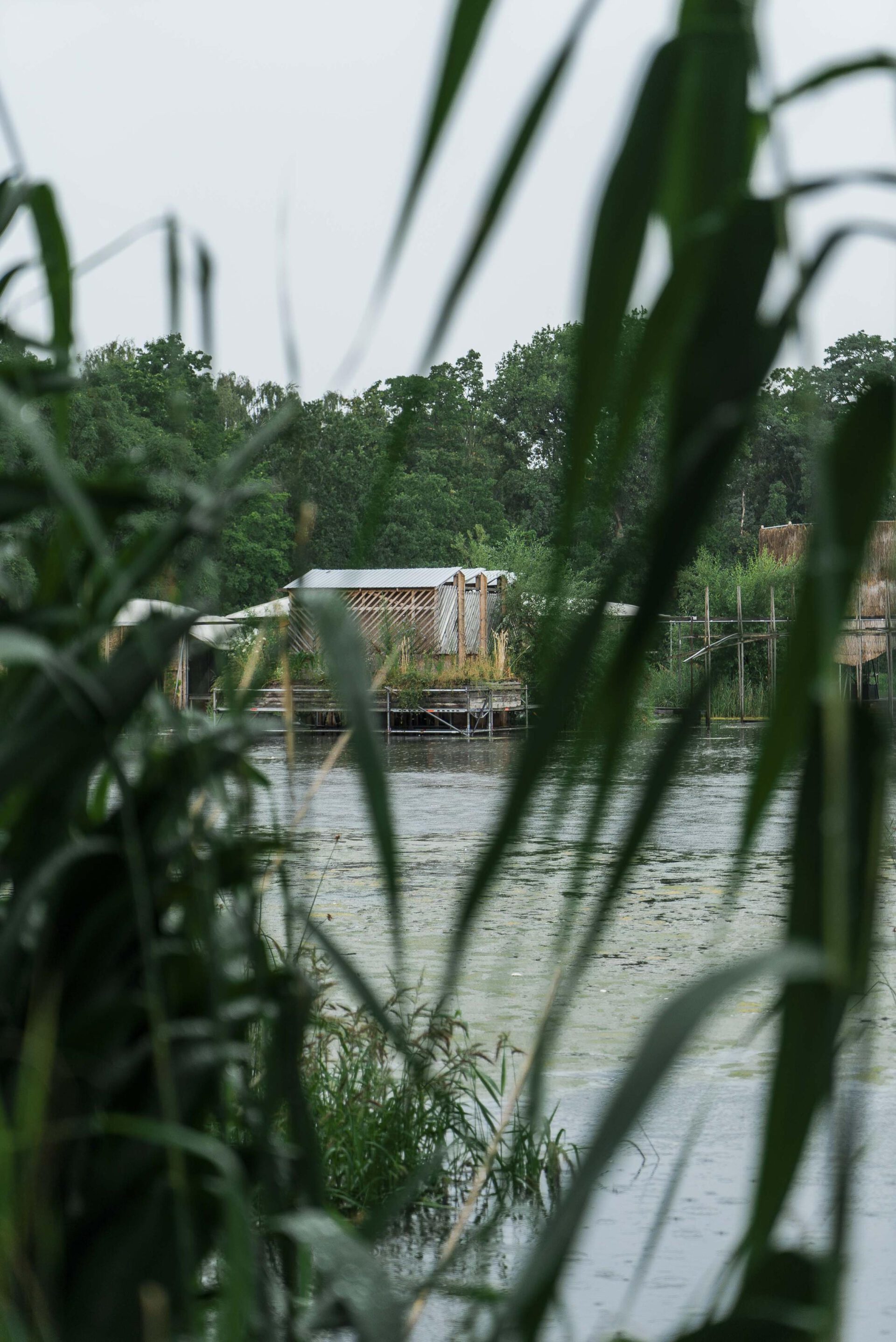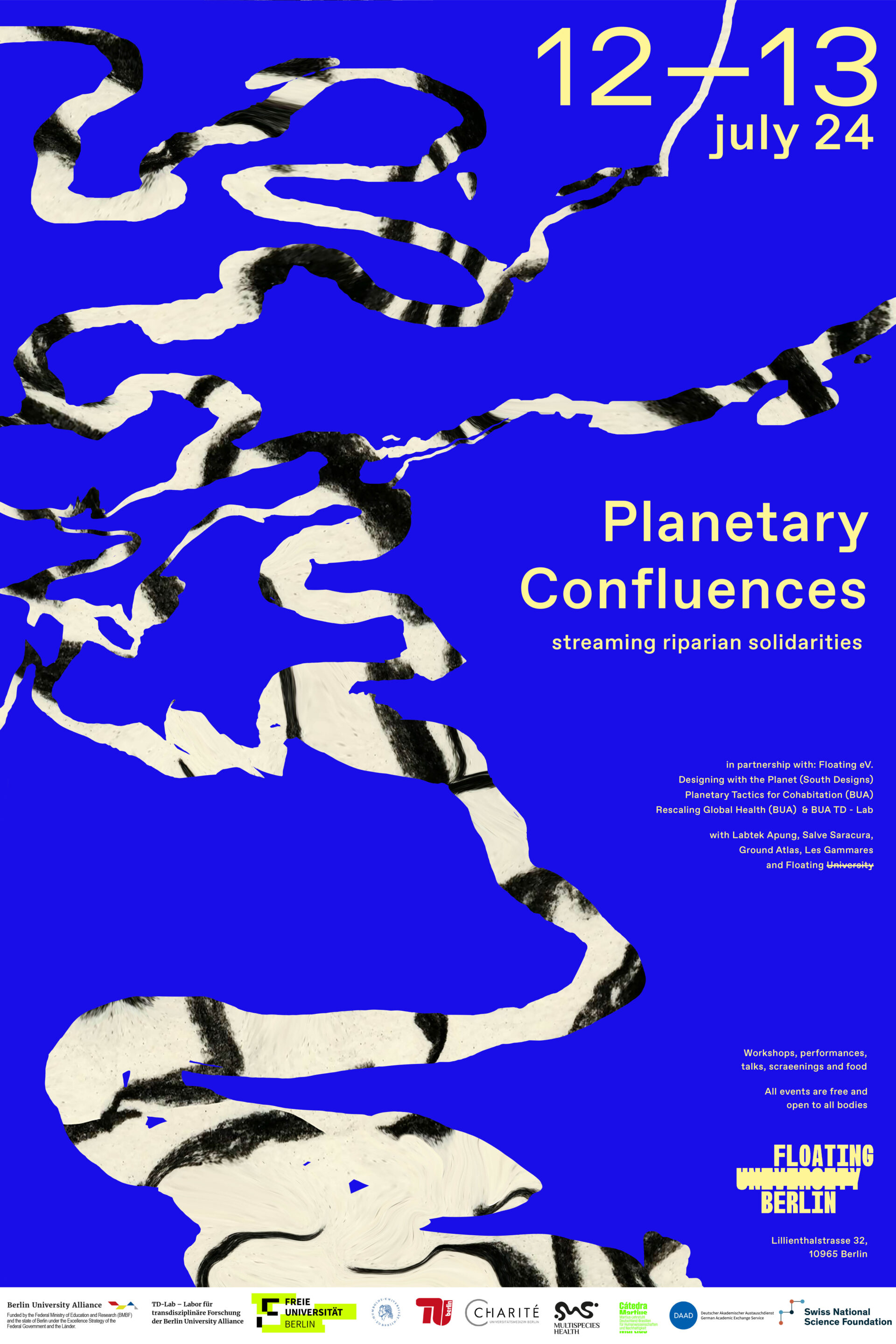Planetary Confluences
streaming riparian solidarities
Photo report of the festival that took place on Friday 12th and Saturday 13th of July 2024.
More about the program here.
Pictures by Sebastian Díaz de León
BIOS & CONTRIBUTORS
• Floating e.V. Berlin is a self organized space and group, where practitioners from a wide range of backgrounds meet to collaborate, co-create and imaginatively work towards possible futures. Floating’s rainwater retention basin is home to a diverse range of animals, plants and algae who have taken root and given birth to a unique landscape: a human-made environment reclaimed by nature where polluted water coexists with the relatively new presence of Floating University, forming a natureculture (Haraway) or a third landscape (Clément).
Ute Lindenbeck is a freelance scenographer working in the fields of performing arts, urban practice, and art education. Since 2000 she has been designing stage and costume designs for operas and theatre, both at public funded theaters and in the independent scene. Lindenbeck’s interest in public space runs through her work, where she primarily creates occasions that bring together diverse people. Since 2019, she has been a member of Floating e.V. and works in the areas of programming, production, acquisition, and public communication.
website
Garance Maurer is a designer and artist, specialised in textiles with a Master’s in textile design from ENSCI-Les Ateliers. Her work was exhibited in France, Germany, Hungary and, Mexico in group and solo shows. She will be a resident of the Villa Albertine in San Francisco in 2024. Since 2021 she’s a member of Floating University where she works as a curator, artist, educator, and researcher. Garance is part of the project “Designing with the Planet” (South Designs Initiative) and co-curator of “Planetary Confluences”.
website
Silja Teresa Huppertz is an artist, activist, curator and mother with a background in cultural sciences. As a founding member of groups like Floating e.V. and Urbane Praxis e.V. she bridges the realms of academia, art, and community engagement. Within the collective she pushes social-ecological transformation through a decolonial, intersectional feminist perspective by investigating various themes by creating context specific interventions and installations.
• TD-LAB – Laboratory for Transdisciplinary Research
Initiated in 2019 as Research Forums, the TD-Lab is the contact point for transdisciplinary research in the Berlin University Alliance. As a structural project, the TD-Lab aims to strengthen the transdisciplinary research mode in the Alliance and in Berlin – for research with society. To this end, the TD-Lab team develops innovative formats, methods and further training, forms new collaborations and networks and supports academics and societal actors in transdisciplinary research.
• ReHealth is a transdisciplinary research project funded by the Berlin University Alliance in the framework of the Grand Challenge “Global Health”. Together with international and practice partners researchers from Technische Universität Berlin, Humboldt-Universität zu Berlin, Charité, Freie Universität Berlin explore urban human-animal-environment relationships and how they affect human health in urban spaces. The project thus investigates the multiple links between health, biodiversity, and environmental pollution.
• The South Designs Initiative project “Designing with the Planet” is coordinated by:
Laura Kemmer holds the DAAD Martius Chair at the University of São Paulo. Her research interests include modes of care, repair and planetary healing across urban waters and grounds in Berlin and Brazil. Together with J. Baxter, she coordinates the project “Designing with the Planet” (South Designs Initiative), and she is an associate member of the BUA project “Re-Scaling Global Health”.
Jamie-Scott Baxter (Dr.-Ing) is an architect-planner and sociospatial researcher. He coordinates the “Planetary Tactics for Cohabitation” living lab within the BUA project “Re-Scaling Global Health. Human Health and Multispecies Cohabitation on an Urban Planet” at the TU Berlin. At the intersection of design and science, Jamie engages critical creative methods to research on, for and with design and planning.
• Labtek Apung is a transdisciplinary collective including an anthropologist, chemist, environmental engineer, artist, and architect. It originated from a citizen science workshop in low-income slum settlements at the lowland areas of the Ciliwung River banks in Jakarta in 2017. Labtek Apung aims to amplify the unheard voices and unseen actions of non-humans who live alongside us, and who, together with humans, play significant roles in maintaining the planetary life cycle.
website
Endira F. Julianda is an art producer who observes the interrelations of human, nonhumans, and space. She has been making art in forms of drawing, painting, and installation and later grew an interest in producing art activities and multi/transdisciplinary approach. She co-found non-profit organization Rakarsa Foundation and is a co-researcher of Labtek Apung.
• Salve Saracura is a collective of activists and artists who work with marginalized riparian communities and organized environmental and housing movements in the center of São Paulo to uncover the city’s hidden rivers, the histories of violent urbanisation and environmental disaster they carry – including the covering-over of indigenous and Afro-Brazilian memories – also connecting these histories to recent events of eviction and displacement, urban floodings and other examples of socio-environmental struggle.
Solange Lisboa, Historian, curator and organizer of exhibitions and cultural projects, as well as embroiderer and activist. She is a member of the collective Aparelhamento, responsible for the creation of the 9 de Julho Kitchen. Solange is a partner of the Movimento dos Sem Teto do Centro (MSTC), member of the Linhas de Sampa collective, which mobilizes embroidery as a tool in feminist struggles, and in 2019 she was involved in the creation of Salve Saracura.
Victor Próspero, postdoctoral Fellow at the Princeton-Mellon Initiative for Architecture, Urbanism and the Humanities, associate researcher at the Center for Studies on Contemporary Spatialities, Institute of Architecture and Urbanism, University of São Paulo. Co-curator of the exhibition “Landscape and Power: Brazil’s constructions under dictatorship”.
Lúcio Teles, an artist from Aracajú/Sergipe based in São Paulo, began as a photographer in the 1990s focusing on Black Culture in Brazil’s Northeast. Founder of “Ancestral Filmes,” he explores racial and environmental themes, blending photography with graffiti in projects like “Afroprogênie” and presenting video art at the São Paulo Biennial.
Ж has a non-specialized & situated cultural practice that investigates the energetic, materialistic, economic, political and libidinal fluxes and cycles of (semio)capitalism. It embraces different strategies, materials, propositions, and media to uncover its effects in perception, memory, and subjectivity in our present ecological collapse. His projects took the form of films, video-spaces, counter-spaces, texts, performances, publications, and public spaces interventions that oriented a sense of the reinsertion of artistic practice in specific social-political contexts.
website
• Ground Atlas Brazil is an academic-artistic counter cartography project by Brazilian architects Ana Luiza Nobre and David Sperling that considers the ground as a world archive and aims at mapping critical points related to contemporary land struggles, processes of urbanization, territorialization and deterritorialization, within a decolonial perspective.
website
Ana Luiza Nobre, Professor, Architecture and Urbanism Department , Pontifical Catholic University of Rio de Janeiro. Brazilian National Council for Scientific and Technological Development Researcher (project “Ground critical cartographies”) and Research Professor at the Center for Studies on Contemporary Spatialities, Institute of Architecture and Urbanism, University of São Paulo. DAAD Grantee. groundatlas.org co-coordinator.
CV and publications
David Sperling, Associate Professor at the Institute of Architecture and Urbanism of the University of São Paulo and coordinator of the Center for Studies on Contemporary Spatialities. Researcher CNPq / Brazilian National Council for Scientific and Technological Development, evolving the project “Cartographies: technopolitics and geopoetics”. Co-coordinator of groundatlas.org.
• Les Gammares collective collective has set itself the mission of caring for the Caravelle-Aygalades stream in Marseille since 2019. It brings together associations, local networks, artists, researchers and committed residents taking joint action by sharing knowledge and restoring the ecologies of the coastal river. Its emblem, the gammare, is a bio-indicator shrimp and a symbol of hope that one day ecological continuity will no longer be broken.
website
Chloé Mazzani, actress, performer, and puppeteer. Since 2019, wih the cooperative Hôtel du Nord based in Northern districts of Marseille, Chloé’s work revolves around in situ creations connected to ecological, social, and urban issues, to find ways to address the ecological crisis and imagine a better future.
Charlie Fox, Artist & Producer. Director of InspiralLondon, Charlie works on innovative artistic production, public and site-specific performance. He works collectively and collaboratively, curating, producing, and incubating cross-disciplinary projects; that develop open, transdisciplinary, ecological and creative skills.
Bulat Sharipov, audiovisual artist, filmmaker, photographer. I In 2013, he co-founded the audiovisual installation studio Tundra. In 2016, he began exploring experimental filmmaking, focusing on themes like urban environments, connections to places, and human-environment relations.Works and lives in Marseille.
Melvil Legrand is a artist, graduate of the European School of Visual Arts in Angoulême, he is now based in Marseille, where he oscillates between sculpture, illustration, and aquatic themes. He divides his time between naval carpentry and leading creative workshops for young audiences.
• The Fluid Lagos Collective came together in February 2024, to tell a story about what “bodies of water” means to us, and queer up authorship in the process. We are artists of various fields (film, dance, visual arts…), we flow and ebb together as ten souls: Anthony, Dopay, Justine, Kamnelechukwu, Laboomz, Lateefah, Morola, Nora, Ramon and Wami.
website
Nora Mandray (she/they) is an artist-filmmaker born in France, educated in the US, and now living in Berlin.
Spanning a conversation on trauma and resilience, their work explores truth-telling as a tool of healing in the age of mass extinction.
website
+ Lorenzo Sandoval (Mar Menor), Camille de Toledo (Parlement de Loire), Jona Möller (students from the «Planetary Correspondences» studio)
A collaboration between: Floating e.V., Designing with the Planet (South Designs), Planetary Tactics for Cohabitation (BUA), Rescaling Global Health (BUA) & BUA TD - Lab
Funded by the Federal Ministry of Education and Research (BMBF) and the state of Berlin under the Excellence Strategy of the Federal Government and the Länder
Funded by the Federal Ministry of Education and Research (BMBF) and the state of Berlin under the Excellence Strategy of the Federal Government and the Länder
